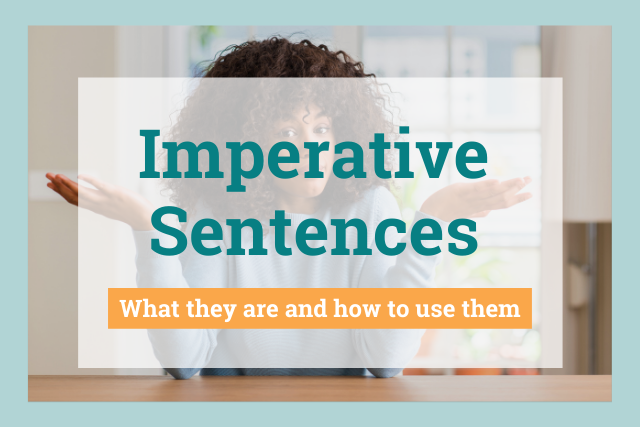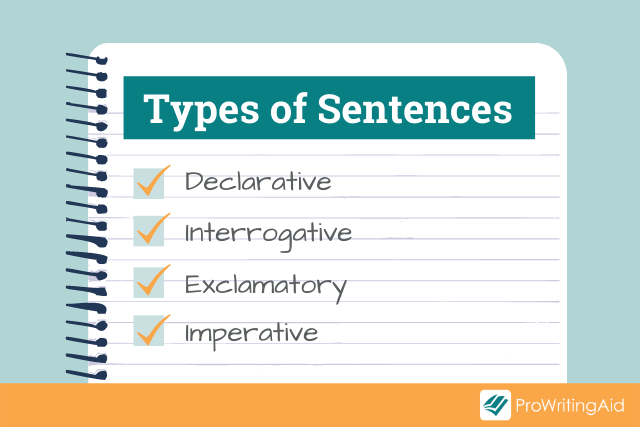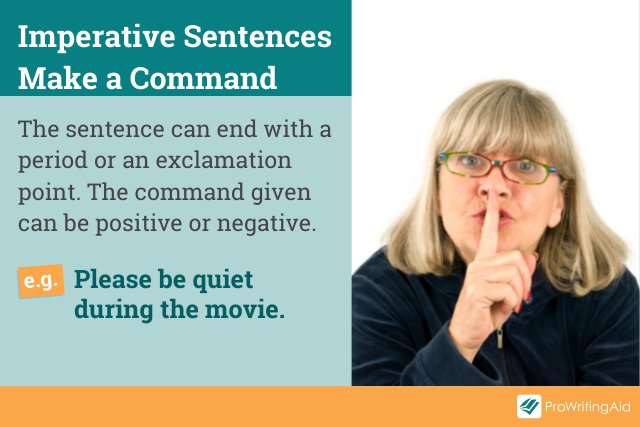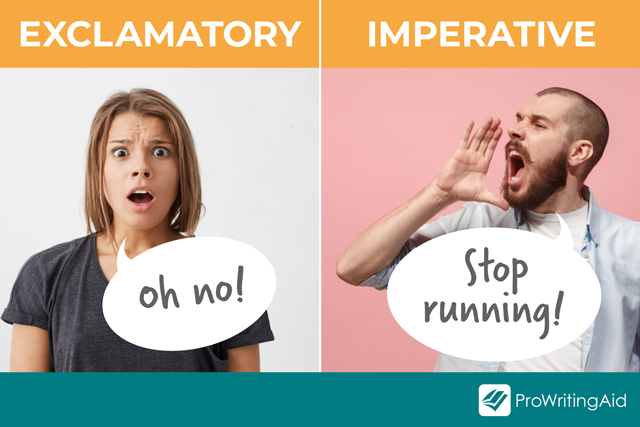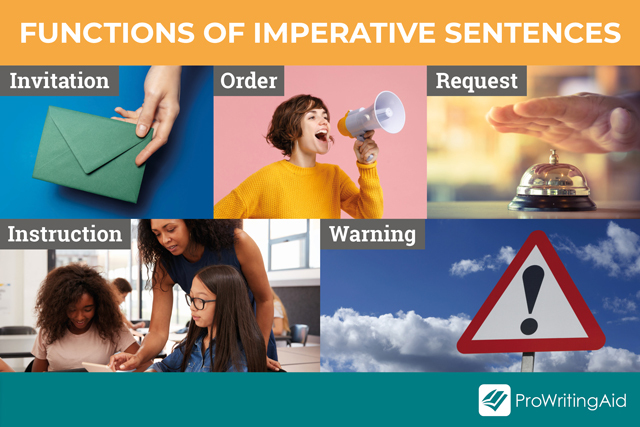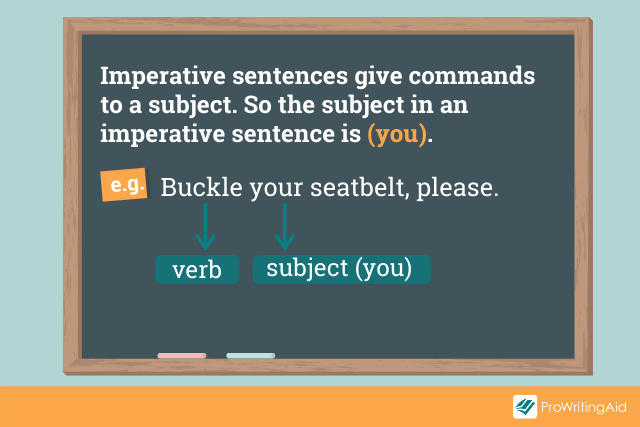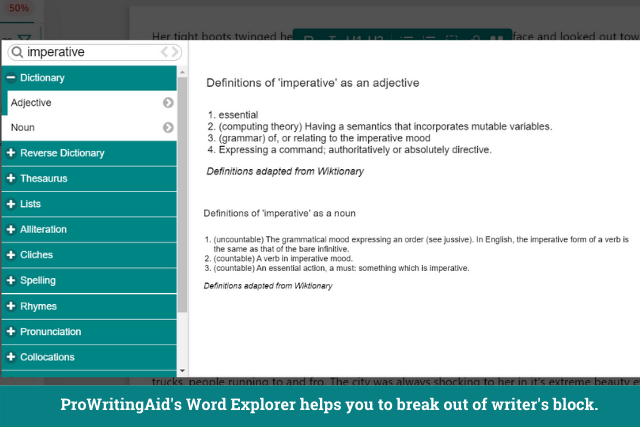-
Do you have questions about imperative sentences?
-
Read this post to find answers.
-
It includes plenty of information.
-
It will make understanding imperatives easy!
If you’re really paying attention, you might have noticed that I included an example of each of the four sentence types in that post opener, including an imperative sentence. Read on to learn more and to see over 40 examples of imperative sentences!
What Are the Four Types of Sentences?
These are the categories for the four types of sentences: declarative, interrogative, exclamatory, imperative.
From these descriptions, see if you can determine which type is represented in the four sentences I used to open the post.
- Declarative sentences make a statement or express an opinion. They end with a period.
- Interrogative sentences ask a question and end with a question mark.
- Exclamatory sentences express powerful emotion—surprise, joy, anger, for example—and end with exclamation points.
- Imperative sentences make a command. They can end with a period or an exclamation point.
Take a moment to go back and evaluate the four sentences that opened the post. Then check your answers!
Answers:
1. Interrogative, 2. Imperative, 3. Declarative, 4. Exclamatory
Positive and Negative Imperative Sentences
The command given in an imperative sentence can be positive or negative, meaning it can be a “do” command or a “do not” command. In positive imperatives, the “do” is often implied, meaning the word “do” is not directly stated. In negative imperatives, the “do not” (or don’t) is stated directly.
Example 1:
Positive: Jump in the pool!
Negative: Do not jump in the pool!
Example 2:
Positive: Slow down!
Negative: Don’t drive so fast!
Is It an Imperative or an Exclamatory Sentence?
You’ve likely noticed that some of the imperative sentence examples I’ve given so far end with an exclamation point, but that doesn’t make them exclamatory sentences.
What’s the difference?
Imperative sentences always give commands. Exclamatory sentences don’t.
The purpose of exclamatory sentences is to express observations or make statements with extra emotional intensity, as indicated through that exclamation point. An exclamatory sentence isn’t a command.
The purpose of imperative sentences is to give commands. If the command comes with an exclamation mark, the mark is there to add urgency to that command. To soften the command, use a period. To add politeness, include a “please.”
Imperative Verbs and the Imperative Mood
While verb tenses tell us when a verb occurred or will occur (past, present, future, etc.), verb moods tell us how that verb is expressed.
One of the verb moods is the imperative mood, which is the mood that forms a command. Imperative verbs often start imperative sentences.
For example,
- Stop!
- Give that back!
- Clean your room.
- Please change the channel.
Yes, “Stop!” is a single verb and a complete sentence all on its own when it is used as a command. (If you’re confused, this will make more sense when you read on about the subject of imperative sentences, so keep going!)
The last example starts with “please,” but don’t let that word distract you. The purpose of the sentence is still to issue a command, and the imperative verb “change” leads that command.
Imperative or Exclamatory? Test Yourself!
Which of these sentences are examples of imperative sentences? Which are examples of exclamatory sentences? Give yourself bonus points if you can identify the movies examples 7–15 are from!
-
The rainbow is gorgeous!
-
Take a picture of the rainbow!
-
I missed the turn!
-
Turn left!
-
Don’t drink the water!
-
This water tastes disgusting!
-
They may take our lives, but they’ll never take our freedom!
-
Say hello to my little friend!
-
You’re gonna need a bigger boat!
-
Pay no attention to the man behind the curtain!
-
I’ll get you, my pretty, and your little dog too!
-
Here’s Johnny!
-
To infinity and beyond!
-
Run, Forrest, run!
-
(a) Look at me. (b) Look at me. (c) I am the Captain now!
Answers:
1. Exclamatory, 2. Imperative, 3. Exclamatory, 4. Imperative, 5. Imperative, 6. Exclamatory, 7. Exclamatory, 8. Imperative, 9. Exclamatory, 10. Imperative, 11. Exclamatory, 12. Exclamatory, 13. Exclamatory, 14. Imperative, 15. (a) Imperative (b) Imperative (c) Exclamatory
Bonus points for the films:
7. Braveheart, 8. Scarface, 9. Jaws, 10. and 11. The Wizard of Oz, 12. The Shining, 13. Toy Story, 14. Forrest Gump, 15. Captain Phillips
What Are the Functions of Imperative Sentences?
The function of imperative sentences is to give commands, but that doesn’t mean they only do the work of drill sergeants or bossy older siblings. Imperative sentences, and the commands they give, have distinct tones and intents and generally fit into one of the following categories:
-
Invitation: Commands can be welcoming! When your friend says “Come over and swim in my pool tomorrow” they are issuing a generous command: an invitation.
-
Order: This would be the work of that bossy sibling. “Get out of my room!” or “Tell Mom I’ll be home later.”
-
Request: Think of this as a more polite order. A doctor’s office may leave a voicemail saying, “Please call us back at your earliest convenience” or send an email stating “Please use cash or credit card to pay your balance.”
-
Instruction: Learning how to bake at grandma’s house? She might say “Now mix in the chocolate chips,” as a command of instruction.
-
Advice or Warning: Good friends give honest advice—“Change your outfit”—and (hopefully) wise warnings: “Don’t go out with him (or her).”
Who Is the Subject of an Imperative Sentence?
Every sentence has a subject and verb, and expresses a complete thought. The verb tells us what the subject is doing or what state of being the subject holds.
- She owns the company. (declarative sentence)
Subject = She, verb = owns
- Johnny buckled his seat belt. (declarative sentence)
Subject = Johnny, verb = buckled
- The mountain is so high! (exclamatory)
Subject = mountain, verb = is
Imperative sentences, though, aren’t about a subject; they give commands to a subject. So who is that subject on the receiving end of the command?
The answer: “you.” In proper grammatical terminology, that subject is known as “you understood” and is written as (you).
Let’s take the declarative sentence about Johnny and turn it into an imperative. Imagine you’ve loaded Johnny into his seat and say,
- “Buckle your seat belt, please.”
Subject = (you), verb = buckle
And that same subject (you) would also be the subject for the sentence Stop!
But what if you had said, “Johnny, buckle your seat belt, please.” Is the subject now Johnny?
Nope. Grammatically, the subject is (you) as it is for all imperative sentences, even if a specific audience is included in the statement.
- Everyone hide!
- Passengers, please remain seated.
- Don’t speak in that tone, Pat.
In each of these examples, as with almost all imperative sentences, the command is given from the second-person point of view—the speaker is talking to (you)—and the subject is simply (you).
How Is the Word Imperative Used in a Sentence?
So far, you’ve seen the word “imperative” used to define or label a type of sentence, and you know sentences categorized as imperative express urgent, or at least important, commands. The words “urgent” and “important” help clarify what “imperative” means when it is used in a sentence rather than to identify a type of sentence.
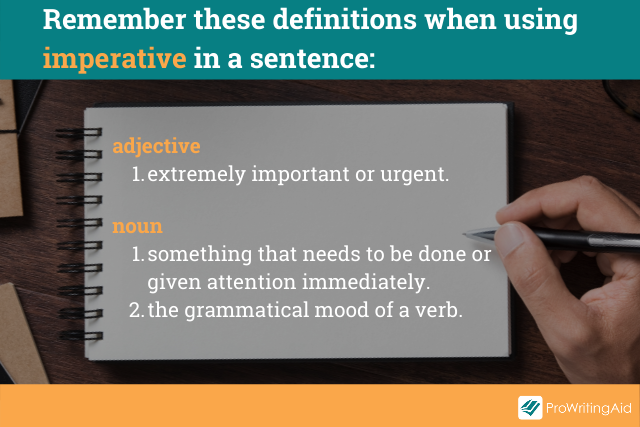
- an adjective that means “extremely important or urgent”
- a noun that means “something that needs to be done or given attention immediately”
- a noun identifying the grammatical mood of a verb (we’ve covered this one already)
Examples of the Word Imperative Used as an Adjective
- Food and water are imperative for survival.
- If you want to get better, taking your medicine is imperative.
- “It is imperative that the governing bodies take note of these findings and work together to protect athletes now and in the future.” (Professor Rick Molloy in sciencedaily.com)
- “For me, it’s morally imperative that we raise the minimum wage to a living wage that’s at least $15 an hour.” (Bernie Sanders in The Guardian)
Examples of the Word Imperative Used as a Noun
- Ending gun violence is not an option, it is an imperative.
- Self-care is an imperative for those who want to live happy and healthy lives.
- “Sleep is not optional. It’s a health imperative, like eating, breathing and physical activity.” (Dr. Judith A. Owens, The New York Times)
- “Minimum-wage workers and activists say $15 an hour is a moral and economic imperative.” (businessinsider.com)
And here’s a double-dipper just for fun:
- If you’re a drill sergeant, it is imperative that you know how to give imperatives.
If you still find that you’re not clear on all the definitions, ProWritingAid offers an easy fix. The Word Explorer is your one-stop for all things definitions, synonyms, examples, rhymes, collocations, quotes, and more. Request a free trial and try it today!
Imperatives Are Everywhere!
Imperatives comprise a significant amount of our everyday communication. We regularly use words to give orders, make requests, extend invitations, provide instruction, and offer advice.
You’ve probably said things today that reflect the commands given in some of these imperative sentences:
- Pass the TV remote.
- Be kind.
- Turn up the music!
- Tell me more.
- Come over for tea.
- Read a book.
- Stop whining!
- Watch this!
Pay attention and you’ll quickly realize we are immersed in imperatives (that was one right there!). Listen to yourself and others (there’s another). Be aware as you read books, watch movies, and sing along to music (and another), and you’ll find imperatives everywhere.
Take your writing to the next level:
20 Editing Tips from Professional Writers
Whether you are writing a novel, essay, article, or email, good writing is an essential part of communicating your ideas.
This guide contains the 20 most important writing tips and techniques from a wide range of professional writers.

‘Imperative’ is a prevalent word in written and spoken English. But can you explain the concept of «imperative» from imperative definition to usage and everything around this word without hesitation? The truth is this is a question that many people have a hard time answering because the word can fit different scenarios.
In a nutshell, «imperative» is defined as «important or vital, to give commands; command, or urgent and essential.» These meanings give the word diverse applications in grammar and linguistics. You can use ‘imperative’ as a noun or adjective in instances that suit the word’s meaning.
In this article, we explore the meaning and usage of the word imperative. We’ll also provide some examples to see how imperative is used in context. By the end of this post, you’ll have a clear understanding of what an imperative is and how to use it properly!
What Is the Definition of Imperative?
As an adjective, ‘imperative’ most common definition is crucial, important, or essential; something of vital importance. Terms like all-important, necessary, and of essence also give the perfect imperative definition.
In sentences: «It is imperative that we attend the meeting.» «To top in your business school class, it’s imperative to pay attention to your professor’s demands.» These two sentences showcase the right usage of «imperative» to mean «of importance.»
In the first sentence, it shows that attending the meeting had some positive results that would not have been realized if ignored. In the second sentence, the student believes that one of the best ways to top the class is to do what the tutor wants; doing so is imperative.
Imperative Word Forms
You can derive an adverb and a noun from the word «imperative.» You’ve probably come across some of these words. They include:
Imperatively (adverb): This word is defined as «in an imperative manner» or «necessitating immediate action.» In other words, use this adjective if you need something to happen right now. Sentences in which «imperatively» is properly used:
- I imperatively needed a sandwich.
- The police officer imperatively demanded that the suspect get on the ground.
- Imperatively, we must not speak to anyone until we’ve got our bearings.
Imperativeness (noun): The word imperativeness means the quality of being important or urgent based on the context. Have a look at these example sentences:
- For the three years I have been studying English, our professors don’t stop reminding us about the imperativeness of grammar use in speech.»
- » Experts recommend that new couples must visit relationship counselors to understand the imperativeness of bonding for a strong union.»
What Is the Meaning of Imperative?
Imperative is also used to mean command: Demanding immediate attention, forceful, or commanding or expressing an order, instruction, or exhortation on something or situation.
These commands can be positive or negative (forcing or suggesting a command). However, in most cases, people use imperative to stress a forceful command. That’s why dictionaries include the meaning of imperative as «an order designed to be obeyed without question or delay.» Synonyms: binding, mandatory, compulsory.
Example sentences using that meaning include:
- The new manager signed imperative instructions upon his arrival, and that’s how the company lost key employees.
- Jake heard someone shouting imperative instructions from the far side of the terrace.
Imperative also means » an urgent and essential undertaking or situation.» In such instances, the word has some compassionate meaning. You can notice some positivity in its use. An excellent sentence to showcase is: «The United Nations believes that there’s an imperative need for greater understanding between all the nations across the continents.»
Imperative As a Noun vs. Adjective
In the above meanings, imperative can be used as a noun. That is, «as a command or order.» As mentioned earlier, when imperative is used as an adjective, it means expressing or giving a command or orders. Let’s see the main differences at the sentence level.
- «The captain gave an imperative for his crew to prepare for the incoming storm.» Imperative here is a noun.
- «The captain’s tone was imperative; we knew the storm was fast approaching.» The second sentence shows how to use imperative as an adjective.
Imperative in Linguistics and Grammar
The English language has three imperatives: First-person singular imperative»`Come here.’ » First-person singular present indicative command «`Don’t drop it!'» and the imperative of direct address «Mary Take out the garbage!»
These are commands. It’s how we tell people to do things around the house, at school, or any place. Commands usually begin with imperative verbs. They can also begin with imperatives (plural for a command).
In linguistics, an imperative is a grammatical mood used to give orders or requests. It is often called «the imperative mood.» The imperative mood is when a verb expresses an action.
Here are some examples of the imperative mood: «Let’s go, Chelsea!» «Go for it!» In the two sentences, «go» is an imperative verb. Imperative mood tells the listener to do something.
How to Use Imperative in a Sentence
Sentences commonly use the word imperative in its noun, adverb, or adjective forms to describe importance, instructions, demands, requests, or commands.
To use a word like imperative correctly, it is helpful to be aware of its meaning and function in context. Knowing how to use the word imperative will give you a more powerful grasp of your vocabulary.
«Imperative» is most often used in formal or academic writing. Either way, it is helpful to stick to the context to avoid confusion. You can also pair the word with additional adjectives to give more context about what it means. Here are some «imperative sentences» to help you understand what we mean better:
- «Calm down your voices.» The teacher said with an imperative tone.
- We should all practice using yoga. It’s an imperative way to stay healthy and strong.
- The World Health Organization has declared these items as imperatives for the refugee crisis.
10 Examples of Imperative in a Sentence
Ready to learn more? Here are 10 example sentences that include the word imperative.
- Observing proper hygiene and health care is an imperative behavior of a responsible pet owner.
- If you want your business to continue to thrive, you must follow the rules. This is your primary imperative.
- The driver’s imperative tone of voice proves that the company deserves better workers.
- «Don’t let the disease take my baby!» That was her mother’s final, imperative statement before she passed away from cancer.
- Paul had an implicit understanding of his parents’ imperative for attending college.
- In the US, teenagers have a sense of entitlement and think their parents’ imperatives are optional.
- The first imperative you must learn as a volunteer firefighter is how to take direction from your commanding officer.
- When going through airport security, the guards will issue an imperative to remind you not to bring any weapon in your luggage.
- Our boss gave us an imperative order to make the deadline earlier than expected.
- The government has declared public health imperatives that all citizens must follow.
How Do You Spell Imperative?
The word imperative is spelled with ten characters of different sounds. These characters include /i-m-p-e-r-a-t-i-v-e/. The spelling starts with a lower intonation and rises smoothly at the end.
Knowing the word’s right spelling is the first step to being a confident author or speaker. That’s why you need to know English phonics and articulate them correctly. In addition to phonics and sounds, make sure you can identify all the characters in a word correctly without a reference point.
How Do You Pronounce Imperative?
Imperative pronunciation varies based on the context you want to fit. Majority of people pronounce imperative as /im pɛrətiv /or /im-per-uh-tiv/ based on its syllables.
Note that the word sounds the same in both American and British contexts. According to Google, both languages produce a /uhm·peh·ruh·tuhv/ sound when pronouncing imperative. You can try listening to different audios to feel how to pronounce the word in different places.
How Many Syllables Are in Imperative?
There are four syllables in the word imperative.
Are you wondering how we’ve come up with this number? Divide the word according to the present vowels. You should come up with im-per-a-tive. During the spelling, you need to stress «per» syllable to get the right spelling and pronunciation.
Imperative Synonym
- Crucial
- Important
- Immediate
- Urgent
Imperative Antonym
- Optional
- Voluntary
- Inessential
- Unnecessary
History & Etymology of Imperative
The term imperative comes from the Latin word «imperare» meaning «Let it be done.» The Old French used the word as «imperatif.»The words are found in the oldest Latin translations of the Bible which Church Fathers made in the 3rd century.
That explains why many sources indicate that the word ‘imperative’ was originally a legal term that describes the mood of verbs in Roman law.
In Latin, there were six inflectional forms to a verb, but only two for future tense. These two futures were the «future indicative» and «future imperative.» The latter form simply meant that you should do what is mentioned, without any further detail. In time, «imperative» became a term to describe commands or orders given by someone in authority.
When Was Imperative First Used?
The first use in grammar was in the 1520s.
Conclusion
If you’ve been misusing the word ‘imperative’ this whole time, you now know the appropriate imperative definition, meaning and usage in sentences from this article. We all know how important it is to use words correctly in our day-to-day lives.
Many people would argue that grammar isn’t essential to perfect your skills. But when texting, talking, or tweeting, not communicating right could be detrimental, especially if your audience is people who don’t speak English as their first language.
Shawn Manaher is the founder and CEO of The Content Authority. He’s one part content manager, one part writing ninja organizer, and two parts leader of top content creators. You don’t even want to know what he calls pancakes.
Asked by: Birdie Lubowitz Sr.
Score: 4.1/5
(15 votes)
An imperative sentence gives a command, demand, or instructions directly to an audience, and typically begins with an action word (or verb). These sentences often appear to lack a subject, or the person, place, or thing that performs the main action.
What is imperative sentence and example?
Imperative sentences are used to issue a command or instruction, make a request, or offer advice. … In the examples of imperative sentences here, you’ll note that each line is issuing a command of some sort: Pass the salt. Move out of my way! Shut the front door.
How do you use imperative in a sentence?
Imperative sentence example
- It’s imperative to your success. …
- Water is imperative for survival. …
- It’s imperative to restrict everything that makes his stomach upset. …
- It’s imperative you see me at the earliest opportunity. …
- It was imperative that everyone understood the rules so that this would not happen again.
What does the word imperative mean in a sentence?
When something absolutely has to be done and cannot be put off, use the adjective imperative. Imperative is from Latin imperare, «to command,» and its original use was for a verb form expressing a command: «Do it!» is an imperative sentence.
What are imperative words examples?
Imperative Verbs: Definition and Examples
- Clean your room!
- Do your homework.
- Take the dog for a walk, please.
- Don’t touch that!
- Do come to visit us whenever you’re in town.
27 related questions found
How do you say the word imperative?
- Phonetic spelling of imperative. im-per-at-ive. im-per-a-tive. im-per-uh-tiv. …
- Meanings for imperative. imperative mood. imperative language. …
- Examples of in a sentence. CanadaVOTES: NDP candidate Hana Razga running in Edmonton—Leduc. IRA orders end to armed campaign. …
- Translations of imperative. Arabic : حتمية Chinese : 势在必行
What are the uses of imperative?
Definition: Imperatives are verbs used to give orders, commands,warning or instructions, and (if you use «please») to make a request. It is one of the three moods of an English verb (indicative, imperative and subjunctive).
Are imperatives complete sentences?
Imperatives are complete sentences, even if the subject you is not indicated as a word, it is understood as definition of the verb form imperative.
Does imperative mean mandatory?
As adjectives the difference between imperative and mandatory. is that imperative is essential while mandatory is obligatory; required or commanded by authority.
How do you use imperatives in English?
You can use the imperative form to give an order, to give a warning or advice, and (if you use “please”) to make a request. To make the imperative, use the infinitive of the verb without ‘to’: “Come here!” “Sit down!”
Which is the best example of a moral imperative?
Some real-world examples provide data on the cost to prevent or treat AIDS. Analyzing the cost-effectiveness of these methods of treatment and prevention is a moral imperative because the most effective use of funds can save more lives.
What is the difference between imperative and important?
As adjectives the difference between important and imperative. is that important is having relevant and crucial value while imperative is essential.
What does it mean if something is imperative?
1 : not to be avoided or evaded : necessary an imperative duty. 2a : of, relating to, or constituting the grammatical mood that expresses the will to influence the behavior of another. b : expressive of a command, entreaty, or exhortation.
What is an example of imperative mood?
Imperative mood meaning: When forming a request or command, a sentence is written in the imperative mood. Imperative Mood Examples: Lindsey, please go clean your room. After you have cleaned your room, take the trash out to the garage.
What are types of sentences?
The Four Types of Sentences
Declarative Sentences: Used to make statements or relay information. Imperative Sentences: Used to make a command or a direct instruction. Interrogative Sentences: Used to ask a question. Exclamatory Sentences: Used to express a strong emotion.
What are the two types of the imperative mood?
The Imperative Mood
- Present Negative Imperative (2nd Person Negative Imperative; First Negative Imperative)
- Future Negative Imperative (3rd Person Negative Imperative; Second Negative Imperative)
Is the word must an imperative?
«Must» is not an imperative. It’s a Modal Verb.
What is a imperative in English?
Imperative can be one of the following: An adjective meaning “completely necessary” or “very important,” but also “commanding.” A noun meaning “a necessity” or “something that is not avoidable,” but also “a command.” In grammar, imperative is also one of the four main verb moods.
What is the difference between directive and imperative?
is that directive is an instruction or guideline that indicates how to perform an action or reach a goal while imperative is (uncountable|grammar) the grammatical mood expressing an order (see jussive) in english, the imperative form of a verb is the same as that of the bare infinitive.
Is I can’t a complete sentence?
It lacks a subject and verb to define the sentence. A corrected response would include a subject and verb: «I can’t. I have too much homework to finish before class.»
How do you teach imperative sentences?
Teaching The Imperative
- Warm up. It has probably been a long time since your students played Simon Says so give them a review of body parts while practicing the imperative form by playing this game. …
- Introduce. Introduce the imperative form using both positive and negative examples. …
- Practice. …
- Discuss. …
- Practice. …
- Produce. …
- Review.
What does an imperative sentence end with?
An imperative sentence gives a command or makes a request. Most imperative sentences end with a period. A strong command ends with an exclamation point. An interrogative sentence asks a question and ends with a question mark.
What are the rules of imperative?
The word order of a sentence in the imperative is: verb + object (if needed). The negative imperative is made with do + not or don’t. Don’t lose that key. Do not come back without it!
…
Commands and orders
- Go away.
- Stop that.
- Keep quiet.
What are the types of imperative?
The two kinds of imperatives: Categorical & Hypothetical Imperatives.
What are the 7 types of sentences?
The other way is based on a sentence’s structure (simple, compound, complex, and compound-complex).
- Statements/Declarative Sentences. These are the most common type of sentence. …
- Questions/Interrogative Sentences. …
- Exclamations/Exclamatory Sentences. …
- Commands/Imperative Sentences.
Повелительное наклонение выражает в большей или меньшей степени побуждение к действию. Оно может проявляться в форме просьбы, совета, приглашения, приказа или запрета. Мы рассмотрим, когда и в каких случаях употребляется повелительное наклонение в английском языке.
Как образуется и употребляется повелительное наклонение
Повелительное предложение чаще всего обращено ко второму лицу (you – вы, ты, Вы), поэтому в нем, как правило, нет подлежащего. Обращаетесь вы к одному человеку или нескольким, можно понять только по контексту. Другая особенность в том, что у повелительного наклонения нет вопросительной формы, ведь мы употребляем его, чтобы «повелевать», а не спрашивать 
Для того чтобы попросить, посоветовать или приказать что-то сделать, мы используем инфинитив без частички to.
Stand up! – Встань (-те)!
Stop talking! – Прекрати (-те) разговаривать!
Switch off the light. – Выключи (-те) свет.
Be quiet when you enter the lecture hall! – Веди (-те) себя тихо, когда заходишь (-те) в аудиторию.
В предложении в повелительном наклонении может быть обращение. Не путайте его с подлежащим, это не одно и то же.
| Обращение | Подлежащее и сказуемое |
|---|---|
| Alice, close the door. – Элис, закрой дверь. | Alice closed the door. – Элис закрыла дверь. |
| Peter, walk the dog before dinner. – Питер, выгуляй собаку перед ужином. | Peter was walking the dog before dinner. – Питер выгуливал собаку перед ужином. |
Если вам необходимо использовать два глагола в повелительном наклонении, поставьте между ними союз and.
Go and tell him to come back. – Пойди скажи ему, чтобы он возвращался.
Sit down and have a rest, you look tired. – Сядь отдохни, ты выглядишь уставшим.
С помощью отрицательных предложений мы будем налагать запреты, просить или советовать чего-то не делать. Для того чтобы образовать отрицание, мы ставим в начало предложения вспомогательный глагол do и частицу not (don’t).
Do not use cellphones here. – Не пользуйтесь здесь мобильными телефонами.
Don’t come in, the floor is wet and slippery! – Не входи, пол мокрый и скользкий!
Don’t bother her. She’s in a bad mood. – Не доставай ее. Она в плохом настроении.
Вежливые формы повелительного наклонения
Англичане не хотят казаться грубыми и неучтивыми. Поэтому они стараются смягчить повелительную фразу и добавляют к ней слова вежливости, такие как please, just, if you don’t mind. Мы можем их перевести как «пожалуйста», «если ты (Вы) не против».
Please close the window. – Пожалуйста, закройте окно.
Put the cup on the table, please. – Поставь, пожалуйста, чашку на стол.
Don’t share this information with him, if you don’t mind. – Не сообщай ему об этом, если ты не против.
Just buy two tickets to the cinema, please. – Купи два билета в кино, пожалуйста.
Please don’t give my cat leftover chicken, if you don’t mind. – Пожалуйста, не давайте моей кошке остатки курицы, если Вы не против.
Другой способ добавить повелению вежливости – сделать его разделительным вопросом. Добавьте «хвостик» к предложению, и оно станет на порядок мягче. Самые частые «хвостики» – will you, won’t you, can you. Об этом типе вопросов можно почитать в нашей статье.
You’ve almost succeeded. Take another effort, will you? – У тебя почти получилось. Сделай еще одну попытку, хорошо?
Don’t mention it ever, will you? – Не вспоминай об этом никогда, хорошо?
Give me my glasses, can you? – Можешь передать мне очки?
Иногда повелительное наклонение используется для того, чтобы что-то предложить или пригласить куда-нибудь.
Have another cup of tea. – Выпей еще одну чашечку чая.
Come to my birthday party tonight. – Приходи на празднование моего дня рождения сегодня вечером.
Повелительное наклонение с let
Если нам необходимо обратиться к первому лицу (I – я , we – мы) или третьему (he – он, she – она, it – оно, they – они), на помощь приходит глагол let (позволять). Если мы говорим о своем действии, за let будет следовать местоимение me (мне).
Let me buy you a present. – Дай мне купить тебе подарок.
Let me help you. – Позволь мне помочь тебе.
Если мы приглашаем кого-то к совместному действию, то глагол let и местоимение us (нам) образуют форму let’s. В формальном контексте мы будем использовать полную форму let us.
Let’s go to the cinema on Saturday. – Давай пойдем в кино в субботу.
Let us begin the annual conference on computer technologies. – Позвольте нам открыть ежегодную конференцию по компьютерным технологиям.
В разговорной речи let’s очень часто обозначает первое лицо единственного числа (I – я).
Let’s see what’s with your hand. – Дай я посмотрю, что с твоей рукой.
Также let’s мы употребляем в кратких ответах вместо yes, когда отвечаем на чье-то предложение.
– Shall we have a break in ten minutes? – Сделаем перерыв через десять минут?
– Let’s. – Давай.
В отрицательных предложениях встречается две формы: let’s not и don’t let’s, вторая считается более формальной.
Let’s not forget to buy milk this time. – Давай в этот раз не забудем купить молоко.
Don’t let’s remind them of the failure. – Давайте не будем напоминать им об этой неудаче.
В третьем лице местоимения he, she, it, they трансформируются в him, her, it, them. Мы ставим их после глагола let. Также после let может стоять имя человека или существительное. Хотя следует упомянуть, что с третьим лицом повелительное наклонение встречается не так часто в английском языке.
Let your children have fun on the playground. – Позволь детям повеселиться на площадке.
Don’t let Jill believe his words! – Не позволяй Джил поверить его словам!
The vase is expensive. Don’t let it fall down. – Ваза дорогая. Не дайте ей упасть.
Эмоциональные формы повелительного наклонения
Если ваше указание осталось без должного внимания, вы всегда можете добавить ему эмоциональности, для этого используйте одну из следующих конструкций:
- Усилительный глагол do
Когда вы хотите подчеркнуть важность вашей просьбы или приказа, используйте усилительный глагол do в начале предложения. В этом случае do может выполнять две функции: показывать нетерпение или делать обращение вежливым и формальным.
Do read this book! – Обязательно прочитай эту книгу!
Do stand up when you listen to the national anthem! – Да встань же ты, когда слушаешь национальный гимн!
Do take your places. We begin the play. – Прошу занять ваши места. Мы начинаем представление.
Мы также можем использовать do без глагола в кратких ответах.
– Can I take the book you told me about yesterday? – Я могу взять книгу, о которой ты мне вчера рассказал?
– Do, it’s on the shelf. – Бери, она на полке. - Повеление с подлежащим
Если вы хотите добавить своему высказыванию сильную эмоциональную окраску, ставьте перед глаголом подлежащее you.
You leave him alone! – Да оставь ты его в покое!
You get out of here now! – Сейчас же убирайся отсюда!
В отрицательных предложениях you может стоять перед или после don’t.
You don’t go, I‘ll be there in a minute! – Не смей никуда уходить, я буду там через минуту!
Don’t you touch the pictures in the gallery! – Не смей трогать картины в галерее!
Еще в качестве подлежащего мы можем использовать someone/somebody (кто-то), everyone/everybody (все), no one / nobody (никто).
She is going to pass out. Somebody call a doctor! – Она сейчас потеряет сознание. Кто-нибудь, вызовите врача!
Nobody move! It’s a robbery! – Никому не двигаться! Это ограбление!
- Повеление с наречием
Мы можем усилить наше предложение наречиями always (всегда) и never (никогда), которые поставим перед глаголом.
Always wash up after dinner. – Всегда мой посуду после ужина.
Never tell her your secrets. She’s a gossip. – Никогда не рассказывай ей своих секретов. Она сплетница.
И последнее, что я хочу сказать: никогда не пренебрегайте тестом 
Тест
Imperative mood. Повелительное наклонение в английском языке
Если вы нашли ошибку, пожалуйста, выделите фрагмент текста и нажмите Ctrl+Enter.
An imperative is one of the four main sentence functions in the English language and is most commonly used to give a command or instruction. Imperatives are sometimes referred to as a directive.
There are four main sentence functions in the English language. They are Declaratives (e.g. The cat is on the mat), Imperatives (e.g. Get the cat off the mat), Interrogatives (e.g. Where is the cat?), and Exclamatives (e.g. What a cute cat!).
Be careful not to confuse sentence functions (also referred to as sentence types) with sentence structures. Sentence functions describe the purpose of a sentence, whereas a sentence structure is how the sentence is formed ie simple sentences, complex sentences, compound sentences, and compound-complex sentences.
Imperative sentences
When we form imperative sentences, we use the imperative mood; the imperative mood is a grammatical mood that forms a command or request. Imperatives can be found everywhere, from recipes and user manuals to road signs and advertising; however, they are most common in everyday speech.
An imperative sentence is formed using a base verb, such as stop, and usually has no subject. There is often no subject present in an imperative sentence because the subject is assumed to be you — the reader or the listener. Imperative sentences end in either a full stop (.) Or an exclamation mark (!), Depending on the urgency of the command.
To put it simply, an imperative tells you to do something.
Imperative examples
Let’s take a look at some common examples of imperative sentences. You’ll notice that some sentences are very short, even one-word sentences, whereas others are longer and more complex. You may also notice that some sentences create a sense of urgency, whereas others have used the word ‘please’ to show politeness.
Here are some imperative sentence examples:
-
Stop!
-
Look out!
-
Close your book, please.
-
Try the other door.
-
Have a nice day.
-
Let the cake cool for 10 minutes.
-
Join us for dinner.
-
Please bring your friends with you.
See if you can identify the purpose of each sentence. Note that the imperative verbs, such as join and bring, are in bold.
Not sure how to spot an imperative? Here are a few tricks. Typically, imperative sentences contain verbs that issue a command. Can you see a subject? Imperative sentences generally don’t contain a subject.

How can I form an imperative?
As you can see from the imperative examples above, the typical form (structure) of an imperative sentence is a verb without a subject. These verbs are called imperative verbs or ‘bossy’ verbs and are always in the present tense. This means we use the base form of the verb, e.g. give, have, go, and stop, and not to give, to have, to go, and to stop.
Each sentence is missing a subject because the subject (you) is implied. Take a look at this sentence as an example ‘try the other door’. This sentence could also read ‘You should try the other door’. However, the subject is obvious and has therefore been removed from the sentence.
Like most things in the English language, there are some exceptions to the rule. So, let’s take a look at some imperative special cases.
Imperatives with a subject
Typically, an imperative doesn’t have a subject as the subject is considered obvious. However, we can add a subject for emphasis, make the subject clearer, or demand attention.
Here are some examples of imperative sentences with the subject.
-
Everybody listen!
-
Look this way, everyone.
-
You stay here!
Imperatives with always, never, and ever
We can also use the words always, never, and ever when forming an imperative; they usually go before the verb in the sentence. These words are adverbs of frequency and can be used to add further information to an imperative.
-
Always look both ways before crossing the road.
-
Never press that button!
-
Don’t ever speak to me like that!
Imperatives with do
We can add the word ‘do‘ to the beginning of our imperative sentences to make the command appear more polite.
-
Do take a seat.
-
Do try and be a bit quieter, please.
-
Do hurry!
What are the different types of imperative?
There are several different types of imperatives that all serve different purposes. Sometimes we use an imperative to warn someone of danger, and sometimes we use an imperative to simply wish someone a pleasant day. Let’s take a look at some of the different types of imperatives and their uses.
| Different types of imperatives | Imperative examples |
| Command or request | Get down from that tree now! |
| Instruction | Take the first exit on your right. |
| Advice | Consider taking public transport home. |
| Invitation | Stay for a drink. |
| Wish | Have a great weekend! |
| Warning | Get down! |
Command or request imperatives
The command is one of the most commonly used imperatives. A command directly requests that someone does something or stops doing something. You can turn your command into a polite request by adding the word ‘please’.
-
Stop climbing that tree.
-
Get down here now!
-
Please open the window.
Command imperatives are most commonly used in everyday speech. You will likely hear your parents and teachers using these kinds of imperative! Although, if you take a look at all the different signs around you, I’m sure you will spot many command imperatives.
Instruction imperatives
An instruction imperative is similar to a command. However, a command is a direct order to do something, whereas an instruction gives information or knowledge the subject may want or need.
-
Let the cake cool for 10 minutes.
-
Turn the oven to 180 degrees.
-
Take the first street on the left.
Instruction imperatives are frequently used in both written and spoken English. They are commonly found in user manuals, recipe books, and road signs.
Advice imperatives
We can also use imperatives when offering advice to people.
-
Think about your decision carefully.
-
Consider taking an Uber home.
-
Wear your black shoes with that outfit.
Advice imperatives are most commonly used in everyday speech. You will most likely use them when talking with your friends and family.
Invitation imperatives
This type of imperative extends an invitation to someone.
-
Join me for dinner.
-
Stay for a drink.
-
Please, take a seat!
These imperatives are used regularly in everyday conversation. You will also see them on, you guessed it, invitations!
Wish imperatives
Wish imperatives are sometimes referred to as unreal commands — this is because we use them to express hope rather than giving an actual command.
-
Have a nice day.
-
Enjoy your holiday.
-
Have a lovely meal!
These polite imperatives are well-wishing rather than commands. It is unlikely that the person who said “have a nice day” isn’t demanding the subject does anything specific with their day — they are simply hoping it turns out to be a good one.

Warning imperatives
Warning imperatives are usually very short. They are used to warn others of danger or an incoming problem.
-
Look out!
-
Duck!
-
Watch out!
Warning imperatives are most commonly used in everyday situations and are usually unplanned.
Types of imperatives: further examples
Let’s take a look at that list of example imperatives again. Did you manage to identify the purpose of each sentence correctly?
-
Look out! (warning)
-
Close your book, please. (request)
-
Try the other door. (advice)
-
Have a nice day. (wish)
-
Let the cake cool for 10 minutes. (instruction)
-
Join us for dinner. (invitation)
-
Please bring your friends with you. (request)
-
Stop! (command)
Keep an eye out for reported speech or indirect speech! Reported speech is when we repeat, or report back, something that someone has said. In this case, the sentences are almost always declarative. For example: ‘Sit down ‘ (= imperative) and ‘She told me to sit down ‘ (= reported speech).
What are some well-known examples of imperatives?
There are thousands of well-known examples of imperative sentences out there, from song lyrics and speeches to marketing campaigns and road signs. Let’s take a look at a few of them:
You have been the veterans of creative suffering. Continue to work with the faith that unearned suffering is redemptive. Go back to Mississippi, go back to Alabama, go back to South Carolina, go back to Georgia, go back to Louisiana, go back to the slums and ghettos of our northern cities, knowing that somehow this situation can and will be changed. —
‘I have a dream’ — Martin Luther King Jr., 1963.
This speech has frequently been described as one of the most imperative speeches in American history. Here Martin Luther King Jr. uses imperative sentences to convey a sense of command and to give advice.
Get up, stand up (Oh yeah) stand up for your rights (Lord, Lord) Get up, stand up (In the morning) stand up for your rights (Stand up for your rights)
Get up, stand up (Stand up for your life) stand up for your rights (Stand up for your life) Get up, stand up (Stand up for your life) don’t give up the fight! —
‘Get Up Stand Up’ — Bob Marley, 1973.
Here, the singer is using imperative sentences to instruct the audience to stand up for their rights. You will notice that, throughout the lyrics, there is no subject; this is because the subject is anyone listening to the song.
This slogan from Nike is a fantastic example of a brand using an imperative to communicate directly with its customers. This slogan challenges us, and orders us to just do it!

Now you have seen some examples of imperative sentences, how many other famous examples can you think of?
Imperatives — key takeaways
-
An imperative is one of the four main sentence functions in the English language.
-
The main purpose of an imperative is to give a command.
-
An imperative sentence is formed using a base verb, such as stop or wait and typically has no subject.
-
Imperative sentences end with either a full stop or an exclamation mark.
-
An imperative sentence has six main purposes. The examples are: command or request, instruct, advise, invite, wish, and give warning.

